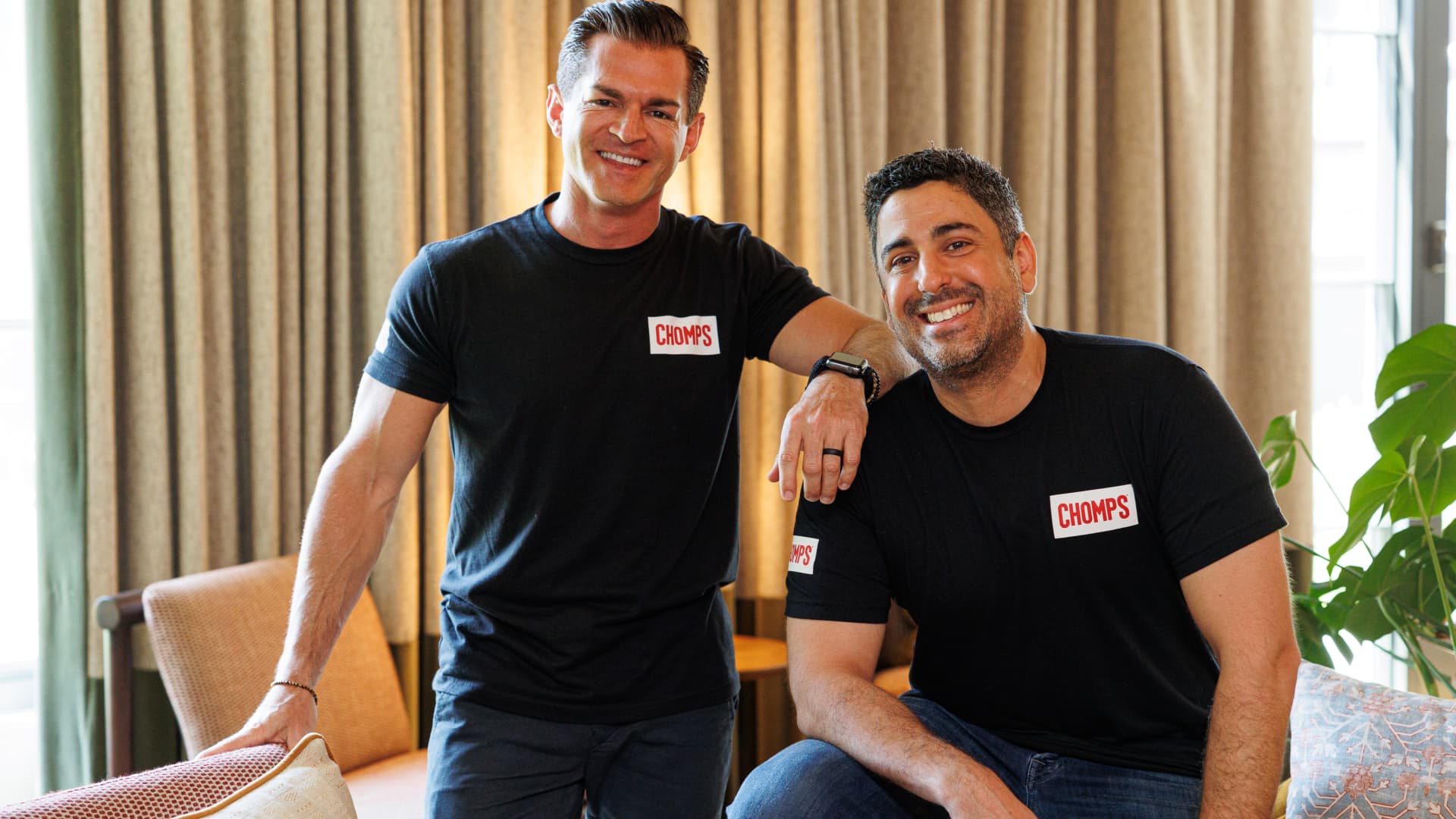Pete Maldonado turned his biggest vice into a multimillion-dollar business.
It all started with a late-night poker game — but this isn’t a story about gambling.
In 2011, Maldonado met his future business partner, Rashid Ali, at a friend’s apartment in Chicago. After a couple of betting rounds, their conversation turned to guilty pleasures.
Maldonado immediately thought of his favorite gas station snack, Slim Jims.
Growing up on New York’s Long Island, Maldonado spent countless afternoons biking up the street to the local 7-Eleven and buying a bundle of beef jerky sticks, as many as he could fit in his basket. “I’d finish all of them before I got home,” Maldonado, 42, recalls.
But after becoming a personal trainer in college, he started cutting Slim Jims — with ingredients that include mechanically separated chicken and corn syrup — out of his diet. Still, Maldonado craved his favorite gas station snack.
He told Ali that he wanted to create a “healthier” meat stick that was high in protein, low in calories and tasted just as good as the snack that defined his childhood.
Ali, who was working as a business operations consultant at the time, thought it was a smart pitch — and just a few weeks later, the pair launched Chomps, a “healthier” beef jerky, as a side hustle from Maldonado’s condo in Chicago.
Since then, Chomps has grown into a nationwide brand attracting more health-conscious consumers to the $17 billion meat snacks market, selling more than 350 million jerky sticks to date. Maldonado and Ali, 43, have stayed on as Chomps’ co-founders and co-CEOs.
Here’s how Maldonado and Ali built up Chomps from a side hustle into a company poised to bring in close to $500 million in sales over the next year.
Coming up with a ‘healthier’ jerky recipe
In 2012, after months of sampling hundreds of jerky sticks in stores across Chicago — and begging friends in other states to mail them their favorite meat snacks — Maldonado and Ali found Chomps’ base recipe at a small corner store six hours away in Greentop, Missouri.
One of their friends in Missouri had mailed them meat sticks made by Kevin Western, a Greentop local who made the snacks for fun and sold them around town.
Maldonado and Ali reached out to Western, who agreed to help them develop Chomps’ initial recipe. He also mentioned that his family ran Western Smokehouse, a local smokehouse operator in Greentop, and could help manufacture the products on a larger scale.
“We wanted to use grass-fed beef and remove a lot of ingredients jerky typically uses, like sugar and nitrates, which can create a lot of manufacturing challenges,” says Ali. “A lot of manufacturers didn’t want to deal with those challenges and do the old way of approaching it. But the Westerns were willing to work with us, and together we came up with a recipe that’s similar to the one we still use today.”
Chomps’ main ingredients include grass-fed beef, water, celery powder, sea salt and red pepper.
“I bought a $99 Photoshop Elements subscription and taught myself how to make packaging,” Maldonado says of Chomps’ original packaging. “It was terrible looking, it had a cowhide print on it.”
Photo courtesy of Chomps
The co-founders pooled about $6,500 of their own money to fund Chomps’ first production run, design packaging, build a website and run ads on Facebook.
“I bought a $99 Photoshop Elements subscription and taught myself how to make packaging,” says Maldonado. “It was terrible looking, it had a cowhide print on it.”
In December 2012, Maldonado and Ali started selling Chomps’ first product — the original beef jerky stick — on its website. At launch, the price point was about $2 a stick (now, the sticks cost about $2.49 each).
Much to their surprise, the company started turning a profit “within a month,” says Maldonado, all of which was reinvested into more product and social media marketing.
A side hustle turned instant success
At first, Maldonado and Ali had full-time jobs and ran Chomps in their spare time for the first couple of years it was in business.
Maldonado, who moved to Naples, Florida in 2013, worked as a real estate agent throughout his 20s and 30s, while Ali stayed in Chicago and continued consulting.
“We took turns hand-packing and shipping orders,” says Ali. “I remember working anywhere from 60 to 80 hours a week as a consultant, then waking up early in the morning or logging off work at 9 p.m. and immediately switching over to Chomps … looking back, I can’t even believe I was able to do that for as long as I did.”
They didn’t expect Chomps to amount to much more than a side hustle, but, as Maldonado jokes, “Chomps had other plans for us.”
In 2013, Chomps’ first full year in business, the pair sold about $50,000 worth of meat sticks. The following year, their sales doubled to $100,000, and the numbers kept climbing from there.
Chomps closed out 2023 with nearly $245 million in retail sales.
Gene Woo Kim
Maldonado credits Chomps’ early success with the rising popularity of different diets including paleo, Whole30 and keto, all of which encourage eliminating ultra-processed foods and replacing them with whole foods like fresh vegetables, meat and fish.
He and Ali started marketing Chomps as a low-carb, sugar-free snack that fit these “healthier” lifestyles, even adding language like “Whole 30 approved” on its packaging.
During its first four years of operation, Chomps sold the snacks directly to consumers through its website, and also to some CrossFit gyms, independent specialty stores and doctor’s offices across the U.S.
Chomps started introducing new flavors in 2013, starting with jalapeno beef. Now, the company offers dozens of spins on the original meat stick, including taco-seasoned beef, pepperoni-seasoned turkey and Italian-seasoned beef.
“A lot of the time, we didn’t even have enough product available on our website because we sold through it so quickly,” says Maldonado. “We’d reach out to people and say, ‘Thank you so much for your purchase. We ran out of product. We’d love to send it to you after if you’ll wait for it. Or we could just refund your money.'”
The phone call from Trader Joe’s that changed everything
In 2016, Maldonado and Ali received a phone call that would change their careers — and Chomps’ trajectory.
Trader Joe’s wanted to start selling Chomps’ original beef sticks in all of their stores across the U.S.
“One of the executives’ daughters was doing the Whole 30 diet and discovered Chomps through researching Whole 30 compliant foods,” says Maldonado. “She quickly became a fan of the product and recommended it to the people she knew that were high up at Trader Joe’s, who then reached out to Rashid and me.”
Trader Joe’s placed an initial order for a million meat sticks to stock in over 400 stores. Maldonado and Ali were still running Chomps as a side hustle by themselves at the time, and felt unprepared — but ecstatic — to fulfill such a big order.
“When you grow that quickly, it blows up your entire infrastructure,” says Ali. “You have to think about the business completely differently, and it forced us to do that.”
Maldonado and Ali say their first big order from Trader Joe’s, which requested a million sticks to stock in their stores across the U.S., changed the trajectory of Chomps’ business.
Photo courtesy of Chomps
Up to that point, Maldonado says Chomps produced up to 10,000 pounds of meat each month “at most” to fulfill customer orders. But the Trader Joe’s order alone required at least 120,000 pounds of meat to be produced within weeks. To help them fulfill that massive order, Maldonado says he and Ali ended up renting additional storage space in Chicago and hiring temp workers to hand inspect the products before shipping them to Trader Joe’s.
Chomps started selling meat sticks in Trader Joe’s, its first national retailer, in July 2016. Maldonado quit his real-estate career soon after to work on scaling Chomps from Naples full time, while Ali waited until 2018, when Chomps opened an office in Chicago and hired its first employee, to leave consulting for good.
“I had people saying, ‘You really want to sell meat snacks for a living?'” Maldonado recalls. “We were passionate about it, though, and we had the conviction that this was going to work.”
Building a jerky empire
Once Chomps started selling its sticks in Trader Joe’s, other stores quickly followed, including Whole Foods, Target and Walmart.
Getting into those retailers has given the business a massive boost: In 2020, Chomps’ retail sales hovered around $45 million, but in 2023, it closed out with nearly $250 million in retail sales.
As Maldonado and Ali will tell it, Chomps’ success can be largely attributed to its commitment to attracting a consumer niche that might feel shut out by its competitors: women.
“The meat snacks market is very heavily male-dominated, and other companies are hitting younger male customers,” says Maldonado. “But we did a brand study in 2018 and found that over 70% of our customer base is female, which is not something Rashid and I were ready for, or expecting, by any means.”
Chomps’ strongest demographic, he adds, is women ages 25 to 45, who “really respond” to the snack’s low sugar content and diet certifications.
Chomps re-designed its packaging to appeal more to a female consumer: bright colors, “zero sugar” in large, bold text and an eye-catching slogan in the center (“All stick without the ick”).
Photo: Clint Boland for CNBC Make It
To strengthen that customer relationship, Chomps re-designed its packaging to appeal more to a female consumer: bright colors, “zero sugar” in large, bold text and an eye-catching slogan in the center (“All stick without the ick”).
In 2021, after bootstrapping the company for a decade, Chomps secured their first funding round — an $80 million minority investment — from private equity firm Stride Consumer Partners, which has also helped the business expand.
Chomps now has two offices, one in Naples and one in Chicago, and 78 employees.
Even though Chomps has been in business for more than 10 years, Ali and Maldonado still think of it as a startup, and say they aren’t taking its recent success for granted.
“Pete and I still run the business like it’s a $100,000 business,” Ali says. That means being careful not to overhire, or overexpand production too quickly. Right now, Chomps is available in the U.S. and Canada.
“Running a snack business is a challenge … I describe it as a house of cards,” says Ali. “Like, anything could happen at any point, you could plateau or you could start losing market share. So we have a healthy amount of stress to make sure that we can continue the pressure on moving forward.”
Maldonado has a bit of a sunnier perspective on the future of Chomps. “This whole thing has become so much bigger than we ever imagined … it’s given us a newfound passion for the business,” he says. “Especially after Rashid and I have gotten older, we’re both married now with kids, we’re even more driven now to make a difference in snacking for families like ours … that’s what we’re here to do.”
DON’T MISS: Want to be smarter and more successful with your money, work & life? Sign up for our new newsletter!







